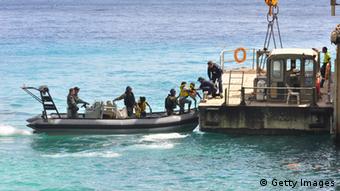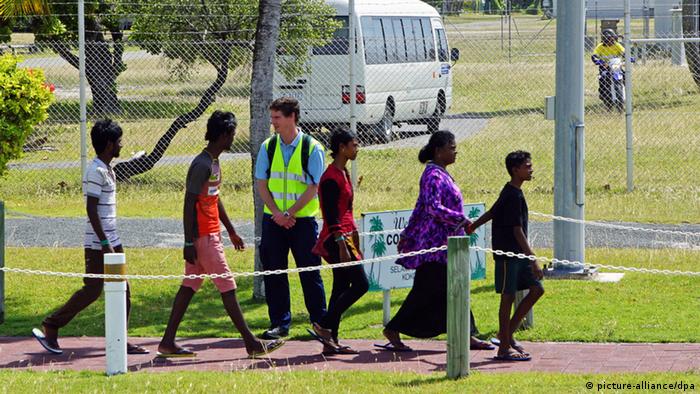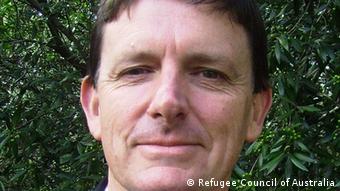Until recently, refugees were also being resettled out of Cambodia for the same reason. Furthermore, Cambodia has committed some of the most blatant breaches of the Refugee Convention in Asia, forcibly returning refugees to situations where they were at risk of serious persecution.
Refugee Council calls on Canberra to release 'all children from detention'
The Australian government has defended its continued detention of asylum
seeker children in camps, a policy which Refugee Council CEO Paul Power
says in a DW interview 'unquestionably' breaches children's rights.
Deutsche Welle | 22 August 2014
Australia's Immigration Minister Scott Morrison defended his
government's tough policy on asylum seekers. Giving evidence to an
Australian Human Rights Commission (HRC) inquiry into the well-being of
children in immigration detention centers on August 22, Morrison said
that measures including detaining asylum seeker children in camps and
the denial of permanent visas were "effective" in deterring others from
boarding boats destined for the country's shores.
The move comes as the minister announced he expected to release some 150
children under the age of 10 from mainland detention centers, as well
as a "large number" of the 1,547 in community detention in Australia.
But children held in offshore facilities on Christmas Island and Nauru,
who arrived after July 19, 2013 are excluded under Canberra's tough
immigration policy.
In a DW interview Paul Power, CEO of the Refugee Council of Australia,
talks about how prolonged indefinite detention has a detrimental impact
on children's health and well-being and calls on Canberra to release all
minors held in immigration detention, regardless of where they are
detained or when they arrived in Australia.
DW: The Australian government said it would grant freedom to around
150 children under the age of 10 currently held in mainland detention
centers. They would be given access to schools, healthcare, orientation
and English-language programs. What do you make of this move?
Paul Power: We welcome any move to release children from closed
detention into alternative community-based arrangements. However, we
don't think the government has gone far enough. There are hundreds more
children in closed detention centers, many of whom have already been
detained for many months, who won't be released under this new policy.
We are calling on the government to release all children from
immigration detention, regardless of where they are detained or when
they arrived in Australia.
What does Canberra mean by "granting freedom" and what would happen if the asylum applications of the parents are rejected?
People who are released on bridging visas are allowed to move freely around Australia, provided that they notify the Department of Immigration if they change their address. They will not, however, have the right to work and their access to support services will be limited. If their parents' asylum applications are rejected, they would be expected to leave Australia along with their families.
The program only applies to children currently in community detention
or in mainland detention centers who arrived in Australia before July
19, 2013. What is the plan for those who have arrived after this date?
The government has pledged that any asylum seeker who arrived in
Australia by boat after 19 July 2013 will be transferred to an offshore
detention center to have their claims processed. If they are found to be
in need of protection, they will be settled in a country other than
Australia. At the moment, the government is exploring options for
settling refugees in Papua New Guinea and Cambodia.
However, serious questions remain regarding the capacity of either
country to protect the rights and well-being of refugees. Neither
country has a strong track record of refugee protection. In the past,
refugees who have sought Papua New Guinea's protection have been
resettled in Australia and other countries because Papua New Guinea
lacked the capacity to provide them effective protection and support.
Until recently, refugees were also being resettled out of Cambodia for
the same reason. Furthermore, Cambodia has committed some of the most
blatant breaches of the Refugee Convention in Asia, forcibly returning
refugees to situations where they were at risk of serious persecution.
The PM wants to ban permanent visas for anyone who arrives in Australia by boat. What are the implications of this move?
The previous Temporary Protection Visa (TPV) policy, in place between
1999 and 2007, was shown to have a decidedly harmful impact on refugees
and placed a heavy burden on the community groups and services trying
to support them. The TPV holders did not have access to the full range
of services they needed to successfully settle in Australia, preventing
refugees from actively participating in the Australian community and
condemning them to a life of dependence.
They were also ineligible for family reunions and could not visit family
members overseas without losing their visas. The combination of
marginalization, family separation and the uncertainty of living on a
temporary visa had a serious negative impact on the mental health and
well-being of TPV holders. Should the TPV policy be reintroduced, we are
likely to see the same negative consequences emerge once more.
Moreover, despite the government's claims that TPVs act as a deterrent,
there is evidence that suggests TPVs actually encouraged some asylum
seekers to travel to Australia by boat. Because TPV holders could not
apply for family reunion, some of their family members facing
persecution overseas – the majority of whom were women and children –
had no other means to reunite with their family members in Australia
than to make the same dangerous journey by boat. Tragically, some lost
their lives in the process.
There are reports about children suffering from grave psychological
problems due to their situation. Doesn't Australia have legal
responsibility for these children?
It is irrefutable that holding children in prolonged indefinite
detention has a detrimental impact on their health and well-being. The
Australian Human Rights Commission has received a wealth of evidence
documenting the serious negative effects of prolonged detention on
children, including developmental delays, serious mental health problems
- such as depression, anxiety and post-traumatic stress disorder - and
the erosion of trust in others. These impacts can also compound the
effects of, and hamper recovery from, pre-arrival experiences of trauma.
 It is irrefutable that holding children in prolonged indefinite
detention has a detrimental impact on their health and well-being, says
Power
It is irrefutable that holding children in prolonged indefinite
detention has a detrimental impact on their health and well-being, says
Power
Australia has a responsibility under the Convention on the
Rights of the Child to safeguard the rights and well-being of all
children under its jurisdiction. Holding children in arbitrary
indefinite detention, particularly when the negative impacts on their
health and wellbeing are so clear, unquestionably breaches this
Convention.
The Minister for Immigration also has a personal responsibility to
protect the well-being of unaccompanied minors, as he is the legal
guardian of children under the age of 18 who arrive in Australia without
a parent or caregiver.
There is a clear conflict of interest between the Minister's role as
guardian of these children and his decision-making role in relation to
visas, detention and offshore processing. It is impossible for the
Minister to act in the best interests of a child while he is
implementing a policy which requires unaccompanied children to be held
in detention under harsh conditions for months on end.
Minister Morrison has claimed that his decision to release 150
children from mainland detention centers will also result in a reduction
of cost to the taxpayer. What do you make of this statement?
The Refugee Council has long argued that community-based alternatives
are a far more cost-effective option than closed detention. However, we
have also argued that it is the human costs of closed detention which
are the most egregious. We urge the Minister to consider not only the
financial benefits of making greater use of community alternatives, but
also the benefits in terms of protecting the rights and well-being of
people seeking our protection.
Paul Power is Chief Executive Officer of the Refugee Council of Australia.




No comments:
Post a Comment